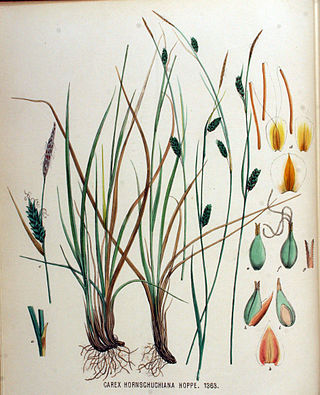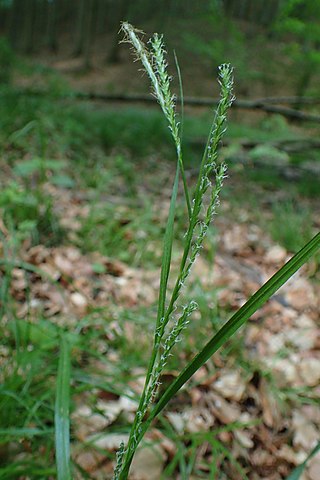
The Cyperaceae are a family of graminoid (grass-like), monocotyledonous flowering plants known as sedges. The family is large, with some 5,500 known species described in about 90 genera, the largest being the "true sedges" genus Carex with over 2,000 species.

Carex is a vast genus of more than 2,000 species of grass-like plants in the family Cyperaceae, commonly known as sedges. Other members of the family Cyperaceae are also called sedges, however those of genus Carex may be called true sedges, and it is the most species-rich genus in the family. The study of Carex is known as caricology.

Carex nigra is a perennial species of plants in the family Cyperaceae native to wetlands of Europe, western Asia, north Africa, and eastern North America. Common names include common sedge, black sedge or smooth black sedge. The eastern limit of its range reaches central Siberia, Turkey and probably the Caucasus.

Carex pensylvanica is a species of flowering plant in the sedge family commonly called Pennsylvania sedge. Other common names include early sedge, common oak sedge, and yellow sedge.

Carex lacustris, known as lake sedge, is a tufted grass-like perennial of the sedge family (Cyperaceae), native to southern Canada and the northern United States. C. lacustris us an herbaceous surface-piercing plant that grows in water up to 50 cm (1.6 ft) deep, and grows 50–150 cm (1.6–4.9 ft) tall. It grows well in marshes and swampy woods of the boreal forest, along river and lake shores, in ditches, marshes, swamps, and other wetland habitat. It grows on muck, sedge peat, wet sand or silt, in filtered or full sunlight.

Carex kobomugi is a species of sedge, known as the Japanese sedge or Asiatic sand sedge, that lives in sandy coastal areas of eastern Asia, and has become an invasive species in the north-eastern United States.

Carex bicknellii, known as Bicknell's sedge and copper-shouldered oval sedge, is a species of sedge native to North America. Carex bicknellii grows in small clumps with fewer than 25 flowering stems per clump. It is found in mesic to dry prairies, savannas, and open woodlands.

Carex brevior, known as shortbeak sedge and plains oval sedge, is a species of sedge native to North America. The specific epithet brevior means "shorter" in Latin.

Carex viridula, known as little green sedge, green sedge, or greenish sedge, is a small flowering plant native to North America, Europe, Asia, and Morocco.

Carex stipata, variously called the prickly sedge, awl-fruited sedge, awlfruit sedge, owlfruit sedge, swamp sedge, sawbeak sedge, stalk-grain sedge and common fox sedge, is a species of flowering plant in the genus Carex, native to Canada, the United States, China, Korea, Japan, and Far Eastern Russia. It is a wetland obligate.

Carex platyphylla, called the broad leaf sedge and silver sedge, is a species of flowering plant in the genus Carex, native to southeast Canada, and the north-central and eastern United States. It is often found in the same forests as Carex plantaginea, also a broad-leaved species, but they do not compete, as C. plantaginea prefers wet areas and C. platyphylla prefers it dry. Silver sedge is considered a useful native ornamental, since it is showy, deer-resistant, and able to tolerate both deep shade and drought once established.

Carex dioica, the dioecious sedge, is a species of flowering plant in the genus Carex, native to Iceland, the Faroes, Svalbard, nearly all of Europe, western Siberia, and the Altai. It prefers to live in calcareous fens.

Carex divulsa, the grey sedge, is a species of flowering plant in the genus Carex, native to Macaronesia, Europe, northwest Africa, the Caucasus region, and the Middle East as far east as Turkmenistan. It has been introduced to northeast Argentina, the District of Columbia and Pennsylvania in the United States, Ontario in Canada, the North Island of New Zealand, and Tasmania and Victoria in Australia. It is the namesake of the Carex divulsa aggregate.

Carex hostiana, the tawny sedge, is a species of flowering plant in the genus Carex, native to Europe and northeast Canada, and extinct in Massachusetts. It is a member of the Carex flava species complex.

Carex strigosa, the thin-spiked wood sedge, is a species of flowering plant in the genus Carex, native to Europe and the Caucasus region. Its diploid chromosome number is 2n=66.

Carex tribuloides, the blunt broom sedge, is a species of flowering plant in the genus Carex, native to the eastern United States, eastern Canada, and Veracruz in Mexico, and introduced in Sweden. It is an important food for soras during their spring migration.

Carex maritima, called the curved sedge, is a species of flowering plant in the genus Carex, with a bipolar distribution in mountains and cold regions. It dispersed in the Pleistocene from the northern to the southern hemisphere.
Carex deweyanaDewey's sedge, short-scale sedge, is a species of sedge native to Canada and the United States.
Carex peckii, Peck's sedge, Peck's oak sedge, or white-tinged sedge, is a species of sedge native to Canada and the United States.

















